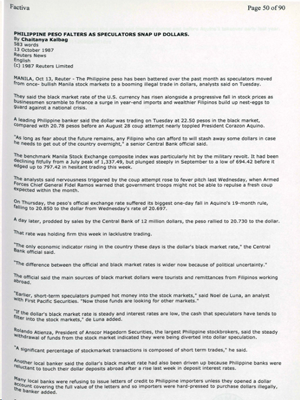PHILIPPINE PESO FALTERS AS SPECULATORS SNAP UP DOLLARS
[Reuters]
Published date: 13th Oct 1987
13 October 1987
Reuters News
English
(c) 1987 Reuters Limited
MANILA, Oct 13, Reuter – The Philippine peso has been battered over the past month as speculators moved from once- bullish Manila stock markets to a booming illegal trade in dollars, analysts said on Tuesday.
They said the black market rate of the U.S. currency has risen alongside a progressive fall in stock prices as businessmen scramble to finance a surge in year-end Imports and wealthier Filipinos build up nest-eggs to guard against a national crisis.
A leading Philippine banker said the dollar was trading on Tuesday at 22.50 pesos in the black market, Compared with 20.78 pesos before an August 28 coup attempt nearly toppled President Corazon Aquino.
“As long as fear about the future remains, any Filipino who can afford to will stash away some dollars in case he needs to get out of the country overnight,” a senior Central Bank official said.
The benchmark Manila Stock Exchange composite Index was particularly hit by the military revolt. It had been declining fitfully from a July peak of 1,337.49, but plunged steeply In September to a low of 694.42 before it edged up to 797.42 in hesitant trading this week.
The analysts said nervousness triggered by the coup attempt rose to fever pitch last Wednesday, when Armed Forces Chief General Fidel Ramos warned that government troops might not be able to repulse a fresh coup expected within the month.
On Thursday, the peso’s official exchange rate suffered its biggest one-day fall in Aquino’s 19-month rule, falling to 20.850 to the dollar from Wednesday’s rate of 20.697.
A day later, prodded by sales by the Central Bank of 12 million dollars, the peso rallied to 20.730 to the dollar.
That rate was holding firm this week in lacklustre trading.
The only economic indicator rising in the country these days is the dollar’s black market rate,” the Central Bank official said.
“The difference between the official and black market rates is wider now because of political uncertainty.”
The official said the main sources of black market dollars were tourists and remittances from Filipinos working abroad.
Earlier, short-term speculators pumped hot money into the stock markets,” said Noel de Luna, an analyst with First Pacific Securities. “Now those funds are looking for other markets.”
If the dollar’s black market rate Is steady and interest rates are low, the cash that speculators have tends to Tilter into the stock markets,” de Luna added.
Rolando Atienza, President of Anscor Hagedorn Securities, the largest Philippine stockbrokers, said the steady withdrawal of funds from the stock market indicated they were being diverted Into dollar speculation.
‘A significant percentage of stockmarket transactions is composed of short term trades,” he said.
Another local banker said the dollar’s black market rate had also been driven up because Philippine banks were reluctant to touch their dollar deposits abroad after a rise last week in deposit interest rates.
Many local banks were refusing to issue letters of credit to Philippine importers unless they opened a dollar account covering the full value of the letters and so importers were hard-pressed to purchase dollars illegally, the banker added.
Dollar-salting by panicky Filipinos appeared to be rising, the Central Bank official said, noting that the peso’s recent violent fluctuations mirrored the peaks and troughs during and before Aquino’s takeover early last year.






